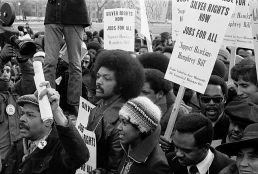Yes, they disagree on Gaza. But the Democratic primary rivals are also far apart when it comes to taxing billionaires and multinational corporations.
By John Nichols, The Nation
Media coverage of Tuesday’s Democratic primary battle between US Rep. Jamaal Bowman—the progressive New York incumbent facing a stiff challenge and a tidal wave of negative ad spending from establishment favorite Westchester County Executive George Latimer and his supporters— has focused primarily on the difference between the two candidates on the issue of Gaza. That’s understandable since Bowman is an ardent advocate for a cease-fire who argues that Israel’s assault on Palestinian civilians should be recognized as genocidal, while Latimer, with massive funding from political action committees and donors associated with the American Israel Public Affairs Committee, defends the actions of Prime Minister Benjamin Netanyahu and his government.

But that’s not the only major distinction between the two candidates in a race where several recent polls have given the advantage to the heavily-funded challenger.
Last week, Bowman joined US Senators Bernie Sanders, I-Vermont, and Ed Markey, D-Massachusetts, in announcing plans to introduce legislation that would impose a 95 percent excess profits tax on what the sponsors decried as “excessive corporate greed.” Modeled on the taxes implemented by the US government during World War I, World War II, and the Korean War to prevent war profiteering, as well as a windfall profits tax that was imposed on oil and gas companies as recently as the 1980s, the legislation could, according to its supporters, raise an estimated $300 billion in one year from ten of the nation’s largest corporations.
Recent Posts
‘The Siege Must Be Broken’: Countries Called to Ship Fuel to Cuba After Trump Tariffs Struck Down
February 21, 2026
Take Action Now The US Supreme Court’s ruling “implies that Trump’s recent order imposing tariffs on countries selling oil to Cuba exceeds the…
Elite Depravity in Imperial Decline, A Zero Hour Conversation With Richard Wolff
February 20, 2026
Take Action Now “The system self-selects for psychopathy… the most sociopathically obsessive competitor and accumulator of personal power and…
Economics of Health For All: The Plan to Put Health at the Heart of the Global Economy
February 20, 2026
Take Action Now At the World Health Assembly in May, member states may endorse an unprecedented strategy declaring that health is not a cost – but…
The Left Owes a Lot to Jesse Jackson
February 19, 2026
Take Action Now As a movement builder, spokesperson, and candidate for the presidency, Jesse Jackson’s accomplishments were massive. He was one of…




